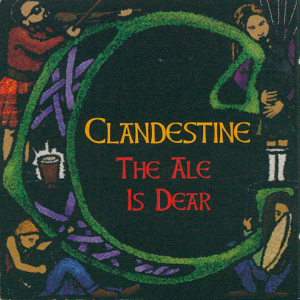 Clandestine, amazingly, is a three-piece contemporary Celtic band sporting guitar, fiddle and bagpipes that predates the Riverdance mania. And it’s based in Houston, too, not a city one would expect to be a hotbed of Celtic music. Unlikely roots, to be sure, but it works for Clandestine, a band that cut its teeth busking Renaissance festivals. Somehow, they manage to avoid having the bagpipes dominate the other instruments, and this balance of power results in a sound that’s as fresh as it is lively.
Clandestine, amazingly, is a three-piece contemporary Celtic band sporting guitar, fiddle and bagpipes that predates the Riverdance mania. And it’s based in Houston, too, not a city one would expect to be a hotbed of Celtic music. Unlikely roots, to be sure, but it works for Clandestine, a band that cut its teeth busking Renaissance festivals. Somehow, they manage to avoid having the bagpipes dominate the other instruments, and this balance of power results in a sound that’s as fresh as it is lively.
From the opening track on Clandestine’s debut disc The Ale Is Dear, it’s obvious this isn’t any run-of-the-mill jig band. E.J. Jones’ highland pipes open “Atholl Highlanders” with a mournful wail, which only sets the stage for a frenzied romp when Jennifer Hamel and Gregory McQueen join in on guitar and fiddle, respectively. They plunge right into “Polka Set” after that, opening with a wispy Shetland Air that intros a rollicking medly of Irish polkas: The Day Dawn, Ger the Rigger and Bill Sullivan’s Polka.
It’s the original “Ottawa” though, that really drives it home that Clandestine is something special. The tension built between the slow interplay of guitar and violin stand in stark contrast to the wild abandon of the lead-in tunes, and when Hamel weighs in with her gutsy, seductive voice with lines like “If we had some dollars/the bus would take us anywhere/but then we’d miss/these humid steams and stars,” listeners are sure to be left with their hearts pounding just a little bit faster. Hamel manages an understated (but unmistakable) eroticism here, and successfully picks that thread up later with the delightfully flip “Saucy Sailor,” a tune popularized by Steeleye Span, but Clandestine makes it all their own.
A highlight of this album is the “Cullen Bay” medley, which tolls Cullen Bay, Lord Lovatt’s Lament, Scotland the Brave and Cabar Feidh into a wonderous progression that takes on an urgency all its own. “Paddy’s Set,” too, is a can’t-miss track, Paddy’sLeather Breeches and The Curlew leading into the quite-unexpected intensity of Hamel’s voice sliding through The Catcher In The Rye. When she coyly asks “If a body meet a body, comin’ through the rye/If a body kiss a body, need a body cry?” and “But all the laddies smile at me, comin’ though the rye,” those words pack much more meaning than Holden Caulfield ever imagined.
(Candletime Productions, 1996)
